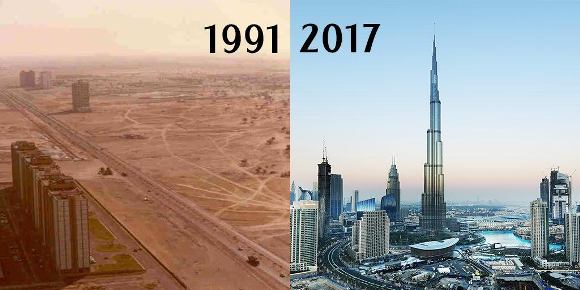This article was updated on January 3, 2021
After my article about why you shouldn’t invest in Japanese real estate, this article will discuss why you shouldn’t invest in real estate in Dubai.
For those that prefer visual content, I have summarised the article in the video below:
If you are looking to invest in more productive investments you can email me (advice@adamfayed.com) or use this page.
1.The past
Dubai was a great city to invest in 20-30 years ago right? People must have made a fortune, when a city has transformed so much, as per the pictures below?

Incredibly, I have met countless expats that have lost money, despite the market being higher than it was 20-30 years ago.
Don’t get me wrong, this is often due to developers, or other issues, and some people have made a lot of money.
The point is, a rising tide, isn’t a guarantee of you making money. This is especially the case when you are outside your home country, and it is easy to be taken advantage of.
2. Dubai during recessions
Every country has good and bad times. However, as Dubai is a hub, which is highly dependent on foreign direct investment, it is more prone to big upturns and downturns.
During 2008, Dubai had to be bailed out by its richer neighbour, Abu Dhabi.
In 2020, it is likely that Dubai will suffer more than a large domestic economy, like the US, India, China or even a Germany or UK.
This isn’t a problem if you factor in these downturns into your real estate plan, but it does mean you have to be cautious.
Qatar’s experience is another warning. After the Saudi blockage, Qatar’s economy suffered a lot.
Dubai hasn’t suffered a similar fate, but it does show that small, rich trading nations, are holding a double edged sword.
Being small and nibble can be a great asset, but can also make the economy vulnerable.
3. Supply and demand
One of the better things about the Dubai property market, is that rental yields are excellent compared to most main markets.
Or let’s put this another way. Rentals are very expensive compared to buying.
According to Numbeo’s Dubai property prices and cost of living, Dubai’s property yields are 10.7%.
In comparison, Taipei, Shenzhen and Shanghai are less than 2%, with London coming in at 3.7%.
However, the reason why property yields are so good in Dubai, is because of the huge oversupply. Occupancy rates are as low as 30%!

Because construction contributes a significant percentage of Dubai’s GDP, it is unlikely that the UAE Government will try to stop this issue.
3. The political issues
Dubai has a well-deserved reputation as a politically stable regime.
However, it is the reality of the situation that it sits in the middle of the Middle East.
Tensions in the Persian Gulf are as high as in the South China Sea, with the issues surrounding Saudi Arabia, Iran, Israel and Qatar.
It isn’t the purpose of this article to be political or take sides. Merely, it is a fact that the political risks are high, if this issue ever spills over.
Kuwait has also been very stable in the last 50 years, but that didn’t stop a war occurring in the early 1990s.
4. Liquidity and leverage (debt)
All around the world, one of the biggest risks with real estate is that it isn’t a liquid asset.
In human terms, that means you might not be able to sell the asset in a timely manner, or at all.
Added to that, during moments of crisis, you might not be able to find tenants.
This is a global issue, especially during moments like 2020, where a global pandemic has showed the risks of relying on tenants.
Many airBnb owners reliant on overseas tenants, have been wiped out, as an example.
However, in the case of Dubai, the aforementioned issues about occupancy and oversupply, could make the illiquidity of the investment an even bigger issue.
In regards to leverage (debt), it can be a huge advantage to buy on mortgage, and leverage your gains.
However, this is another example of a double edged sword. When times are good, leverage works well.
In economic crisis like 2020, it is a big risk, unless you are buying at the bottom.
5. The alternatives
There are many other ways to buy real estate. That can include REITS, which are much less risky in many ways.
There are also countless liquid expat investments, that you can invest in.
These types of investments also typically give you the ability to get a yield/dividend, alongside capital growth.
Even if you want direct real estate, some depressed markets, like the UK, offer a better alternative.
6. The hassles
Real estate involves hassles everywhere in the world, unless you outsource it to a third party property management company.
A tenant calling you at 20:00, or the boiler breaking on Saturday afternoon, are just two examples of hassles.
As an expat, who is outside your own country, these hassles could be bigger than usual.
Conclusion
The best thing about buying Dubai property is the huge rental yields on offer – as high as 10.7% on average.
However, finding tenants might be difficult with such low occupancy rates, and supply and demand fundamentals are bad for investors.
So Dubai is probably a better place to invest than Japanese real estate, but still has a lot of risks.
Further Reading
Does property usually beat stock markets, even in “hot markets” like London and some Canadian cities?




Depends on many things, but even many cities in the UK or US have better fundamentals. Some developing countries as well have high risk/high return potential, but also high risk.
Dubai is high risk for small time investors, the law will not work for you, it works in favor of the rich, businesses located in the country and its own personal interests. This is evident from recent court rulings which are not easily available to the general public. The courts in Dubai are financial institutes which practice law at high school level. The glamour and flashy brochures places a dark shadow of the underlying incompetency of the institutions which are meant to protect and serve.